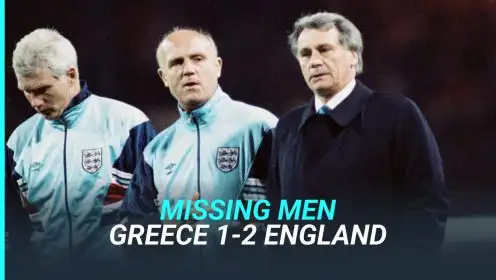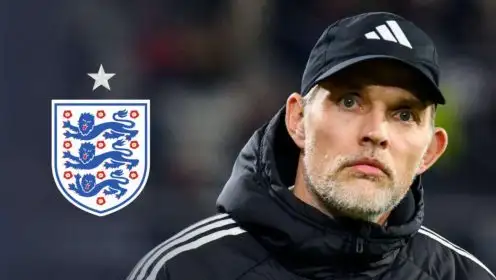16 Conclusions on England limping past Slovakia: Southgate out and at least three players need dropping

Gareth Southgate is still England manager but this reprieve must come with wholesale changes for the Euro 2024 quarter-final after another poor performance.
1) Who else?
Jude Bellingham’s response to his extraordinary equaliser could have been interpreted in many different ways across the preceding 90 minutes and stoppage time. Who else would summarily fail to extract anything even vaguely positive from this ludicrously talented group of England players? Who else should get the opportunity to manage them next? Who else could affect this game from the bench? Who else could have impacted it if not omitted from the squad? Who else wanted to share their tactical plan to fix England, which inevitably amounted to more than the actual manager’s decision to stick for so long with something which not only wasn’t working, but never actually has.
England entered this tournament with a couple of issues to address: the left-back situation and Declan Rice’s midfield partner. They have reached the quarter-finals with four performances which have both failed to answer those questions while simultaneously asking about five new ones in each game.
Two goals scored within the space of about two and a half in-game minutes do little to change that; the sight of Gareth Southgate reverting to something resembling his initial strategy of Rice and Conor Gallagher as midfield pivots in extra-time, protecting a makeshift defence leading to the isolation of a lone centre-forward while defending a narrow lead England seldom deserved inspires little confidence in the wholesale adaptations necessary to have a hope against Switzerland in the next round.
But England even being able to look ahead to that game instead of conducting a post-mortem somehow more shameful and humiliating than that which followed the Iceland debacle in 2016 is testament to the sort of decisive individual brilliance they have infuriatingly not come close to properly harnessing yet. That they boast this calibre of player in abundance is still startling, not least because it is so exasperatingly at odds with what England are actually showing themselves to be capable of.
When they needed someone to step up and out of the stifling, shackled, slow system they have been placed into, who else but the Real Madrid superstar European champion who has scored six goals in second half stoppage time for club and country this season? And how fitting, in the context of this incomprehensible team, that the question of whether he should be moved or even start at all went unanswered by every uncertain, tired touch which came before and after his moment of divine innovation.
2) Southgate would have had to walk. Roy Hodgson bowed out from the England post with his iconic “I don’t really know what I am doing here” line at a European Championship eight years ago and after 93 minutes this was far worse with a much better group of players.
The FA and Southgate obviously want to stumble through this uncomfortable marriage for as long as possible, with a December 2024 contract expiration allowing for a theoretical post-tournament cooling-off period but far more likely an extension of his terms, with no obvious candidate to replace him. Defeat here and in this manner would have made it impossible; Southgate could not have lasted another week.
“We were thinking should we take him off, but you know he is capable of those sorts of moments,” Southgate said afterwards of Bellingham and he could just as easily have been discussing Harry Kane; both were poor and ended up being subbed off together at the start of the second half of extra-time, not before keeping the manager’s reign on life support.
But those are the margins. Southgate would have been slaughtered if England were eliminated and he had kept the obviously knackered and frankly awful Bellingham and Kane on, yet he could not shake the idea that “those sorts of moments” would eventually fall in their favour. The line between genius and insanity is rarely finer than with football management and Southgate desperately needed that flash of wisdom.
3) Quite what he does now is a mystery. The one constant with England in this tournament has been the public demand for change which has likely never been internally contemplated. After and even during the games against Serbia, Denmark, Slovenia and now Slovakia, the England clamours have been loud but Southgate and his team have pointedly referred to any and all criticism as “external noise” – they intend to try and block it out and continue with their process, and extensive rotation was never an option.
With the stakes higher than ever in the knockout stages, there were signs that things had shifted somewhat. Cole Palmer has become the designated first substitute, Kane and Bellingham were both taken off with the result still in the balance and Ian Wright’s suggestion of Bukayo Saka at left-back was even trialled to a degree of success. These were kind of the in-game decisions Southgate is frequently accused of shirking, even if he did leave it bizarrely late here.
But his blueprint for Switzerland is impossible to decipher. The irony of his only starting line-up changes from match to match thus far being in central midfield, the one area in which those who must play is now beyond doubt, is not lost. Kobbie Mainoo has cemented himself as Rice’s second but both full-backs and every attacking place warrants scrutiny and deliberation.
The suspension of Marc Guehi necessitates at least one change. After four team displays ranging from really quite bad to utterly abysmal, there should be at least a couple more.
MORE ON EURO 2024 FROM F365
👉 Updated Euro 2024 Power Rankings
👉 England player ratings v Slovakia: Bellingham and Kane poor but decisive as Walker struggles
4) The Guehi ban for Switzerland is the consequence of two bookings in similar positions on the pitch, thwarting burgeoning counter-attacks. It was his own mistake in the Slovenia game which the centre-half compounded with a foul; against Slovakia, Kieran Trippier’s short pass sold him within three minutes and placed the Crystal Palace defender on a ridiculous tightrope.
Trippier and Kyle Walker were atrocious in the opening stages and did not improve considerably. The former exposed Guehi with that pass and had what must be legally described as England’s first shot, despite it exiting the camera’s view vertically when he had accidentally ventured into a presentable area. Slovakia targeted his side to great effect, although Trippier finally contributed more in attack before his injury-enforced substitution; he even used his actual left foot twice to assist the disallowed Phil Foden goal.
But whether he is available next Saturday or not, this is another experiment which must be curtailed. England used four different left-backs in this game and the least solid defensively, the one which imbalanced the team the most, was the one which started.
5) Walker deserves credit for somehow making right-back more of a problem position despite it being one he has ostensibly made a career out of playing. The way Slovakia got behind him with unerring frequency early on was alarming, yet still less so than his apparent lack of the recovery pace which, for some people, makes his selection essential.
His positioning and lack of awareness for the goal was, in and of itself, a droppable offence. A simple long ball undid England and pulled both central defenders into uncomfortable areas but Walker ran around aimlessly and then stood on the penalty spot to meticulously ensure Ivan Schranz was onside, while monitoring a pass to Lukas Haraslin which David Strelec was never going to play.
The justification for not using Trent Alexander-Arnold at right-back seems to centre entirely around the defensive ability of both players. The Liverpool man has never been as bad in that department as his critics claim, while the signs of Walker struggling there have been evident for some time.
6) That Guehi booking was the first of four in the opening 17 minutes, three of which went to England. Halil Umut Meler showed cards for four of the game’s first six fouls in a presumed attempt to set a tone he himself failed miserably to follow: Juraj Kucka was given a yellow in the 13th minute, committed three more fouls thereafter and only left the game when he was substituted 10 minutes from normal time.
While engaging in referee discourse is a truly dreadful thing, that was a peculiar performance which at one stage threatened to become farcical.
7) Bellingham was apoplectic at his booking and actually really quite naive and foolish, remonstrating with and appealing to the referee despite the clear directives which every other player has managed to follow thus far at Euro 2024 not to argue with the officials.
He did superficially get the ball with his tackle on Haraslin, but had to come through the Slovakia forward to do so. It was at the very least a foul, and already Bellingham’s second at that early stage.
Until Kane stepped in to usher Bellingham away, it looked like he might genuinely carry on his protestations and follow the gilded paths of David Beckham and Wayne Rooney a little too stringently with an immature and irresponsible red card in an international tournament knockout game. It was the most teamwork they had shown all summer, and a sign of the pressure these otherwise seemingly calm, collected players are under.
8) There were a couple of good driving runs from Bellingham into the Slovakia area but those central surges from England were otherwise reliant upon Mainoo, who at times provided the impetus alone on his first competitive international start.
Anything at all productive England conjured ran through the Manchester United midfielder and his one-touch combinations, speed of thought and desire to create. The way he watches moves develop and identifies the spaces he can exploit, drifting into them, making himself available and quickly offloading, is sadly not on many other English wavelengths in Germany so far but the hope is that some teammates can catch up.
The way he collected the ball, took a couple of players on and shot to win a corner through a deflection in stoppage time of a miserable first half was striking. The relative banality of those actions together underlines how poor England were but Mainoo establishing himself as something close to Kalvin Phillips was a rare, potentially unique, positive note.
9) The rest of that first half was indeed a curious experience. The main image of England at this tournament is of a team making it look as hard as possible to play elite football. And that obviously is a difficult art, but it should not be so palpable when watching players of this quality level.
Jordan Pickford advancing 20 yards out of his box, ushering his teammates forward and then just launching it long for Saka; Trippier showing for the ball, shrugging at the lack of options available to a left-back who only uses his right foot and passing back inside to Guehi on repeat; John Stones capturing the essence of England’s tournament by carrying the ball forward, seeing nothing ahead of him and angrily turning back to recycle possession.
It was almost impressively incoherent and disjointed, and the lack of half-time substitutions was genuinely remarkable.
10) That honestly felt like the stick with which Southgate would be beaten forevermore at the time. He could not possibly have witnessed those 45 minutes with objective eyes and deduced that all England needed was more time in the exact same shape with those players. That decision summed up the conservativism many feel has defined his reign.
Within two minutes of the restart, England had reverted to passing it back and sideways in defence as Slovakia broke no sweat in containing them. That injury to Trippier was frustrating not least because it would have been interesting to see when Southgate would have finally blinked without it. He did not make a single enforced substitution until the 84th minute, when Eberechi Eze replaced Mainoo, with the commentary team filtering news through every five minutes of the latest England player to be called from the bench to warm up in earnest.
By far the best substitution of the five Southgate made was bringing on Ivan Toney in the third minute of stoppage time, although Palmer was good again. Even looking beyond the Brentford striker’s headed assist for the Kane goal, his performance as the lead-protecting lone centre-forward when the scorer went off was brilliant.
It was a graveyard shift masterclass from someone supposedly only on the plane because of his penalty prowess. In half an hour, Toney won more headers than any teammate bar Guehi – including one crucial front-post intervention from a late corner – and no player on either side was fouled more often. By winning those pressure-relieving free-kicks alone, he proved himself an entirely worthy alternative to this version of Kane.
11) Southgate was, in fairness, within a few inches of having his lack of substitutions completely justified. A sweeping England move resulted in the ball finally being played to Kane’s feet by Saka, and Trippier being slipped in down the left. He centred for Foden to equalise, yet the Manchester City forward had needlessly strayed offside when unmarked.
It was the sort of thing Foden would simply never do with Manchester City, a moment belying his astonishing game intelligence and supporting the theory that something inherent changes in these wonderful players once they don the England shirt. Southgate cannot be blamed entirely for that or at all for the discretion on that goal, and another poor display prompts further questioning of where he fits in this team.
12) The regular refrain is that there simply must be a place for Foden, and it has to be in the sort of central areas Pep Guardiola deploys him, despite him being used at least as often on the left and right for his club.
His manager ultimately decides where he plays and in what role; the onus is on Foden to perform it better instead of chucking aimless deliveries into the box for Slovakia to happily defend.
Despite his obvious reluctance when being shifted to left-back during the second half, Saka provided a brilliant example of what Foden must strive for. One of England’s better players in attack, at least in the sense that he was willing to try and take a defender on, was moved to a position he publicly dismissed as being the “solution” for before the game, yet he carried it out well.
Saka was not brilliant on the left side of defence, nor did he need to be. He brought stability and his sacrifice of playing at least three different positions during the game should not be overlooked. England need more to display that sort of adaptability and selflessness.
13) Did anyone else kind of want that Strelec shot from the halfway line to go in when he intercepted a Bellingham free-kick played short to Stones who wasn’t watching?
14) There is a perverse joy in England’s equaliser coming from a throw-in launched into the box and flicked on, with the exorcism of those Iceland 2016 demons a little too on the nose.
The winner coming from a cleared free-kick which Eze skewed back into the box with a mishit volley, for Toney to head to the back post to an unmarked Kane, does not engender immediate confidence in England’s attempts to break down Switzerland without some extensive work being done in the next six days.
There has been little sign of Southgate’s training-ground work so far, neither from set-pieces nor in open play. The nature of this win could be transformational if the momentum is used properly, but Switzerland is the biggest step up yet and England cannot rely solely on a repeat of those “moments”.
15) England even ticked the very modern ‘suffering’ box after Kane’s goal. Slovakia were far from done and Southgate’s side knuckled down, having less than 30 per cent of the ball across those final 30 minutes.
Rice was integral with a couple of crunching tackles, while Ezri Konsa contributed from the bench and Eze at left wing-back was vital in at least putting Peter Pekarik off when the right-back was found at the back post. Walker did well in a similar situation against David Hancko.
England posed a threat on the counter and Toney should have done better after good work from Palmer. It was not nearly comfortable enough to suggest they could dependably sit back – certainly not against a better opponent – but it was heartening to see England come through when forced onto the back foot for a sustained period.
16) “Southgate is his own harshest critic” was a bold and entirely wrong claim from the commentators as the second half wore on; even in guiding England to a fourth quarter-final in as many tournaments, the vitriol is tangible.
As bafflingly late as they were, he can nevertheless be credited with making game-saving changes to put England back towards the right course. The formation switch with wing-backs and two strikers was an uncharacteristic Hail Mary which paid dividends; Saka on the left was unusually bold, too.
But that was Southgate knowing he was on the brink, needing a goal with minutes remaining to save his job. And even then he seemed too cautious and safe, rescued by a bicycle kick and the brief injection of impetus it provided.
At this point, he has to draw a line under these subpar performances, rip up the template with which he entered this tournament and start afresh, piecing together the few positive pieces which have revealed themselves in this puzzling summer. So little of what Southgate and England planned has worked and they no excuse not to react now.
Your reward for reading all 16 Conclusions: a conflicted Mailbox





